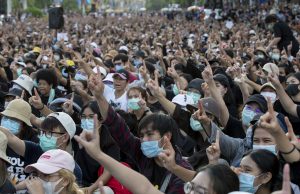The demonstration that took place in central Bangkok on August 16 in support of political reforms and the drafting of a new constitution was Thailand’s largest pro-democracy protest since the 2014 military coup. It also featured something nearly unprecedented in recent memory: open criticism of the monarchy and its central role in Thai politics.
During the wave of recent public protests, the demands of the participants have been clear: They want a military subordinate to an elected civilian government and a monarchy shackled by a new constitution. They also want an end to the harassment of political dissidents, who have recently been prosecuted, abducted, and murdered, presumably by agents of the Thai state.
The proximate cause of the protests is the political conditions within Thailand. Already strained by the repressive actions of the administration of Prime Minister Prayut Chan-o-cha, who scraped through a flawed national election in March 2019, the country now faces a jarring economic contraction due to the COVID-19 pandemic, which saw the Thai economy shrink by 12.2 percent in the second quarter.
At a deeper level, the protests are also a manifestation of a nearly century-long political struggle dating back to the overthrow of Thailand’s absolute monarchy in 1932. This struggle has pit Thais advocating a greater degree of popular sovereignty against a traditional elite claiming a moral right to rule. And at its heart sits the vexed question of the political role of Thailand’s monarchy.
This is not a question that Thais can safely debate in public. Under Thailand’s severe lèse majesté law, criticisms of the monarchy are punishable by prison terms of up to 15 years. This gives what would otherwise be routine calls for reform a revolutionary edge.
Thailand’s unspoken question has been whispered ever more audibly since the death of the revered King Bhumibol Adulyadej in 2016, and the accession to the throne of his son Vajiralongkorn. To a great extent, the cult of Thailand’s monarchy, fashioned since the 1950s by the country’s military-royalist elite, was built on the person of its longest-reigning king. After taking the throne in 1946, Bhumibol reigned for more than 70 years, during which time he commanded great popular respect and projected a considerable moral authority, strengthening official propaganda that placed the king “above” the realm of politics.
What was present in the father appears to be lacking in the son. After being designated crown prince in 1972, Vajiralongkorn developed a reputation as a gambler and womanizer, and has attracted international headlines like “Vajiralongkorn: From jet-set playboy to king of Thailand,” to cite one recent example. In his 2014 book “A Kingdom in Crisis: Thailand’s Struggle for Democracy in the Twenty-First Century,” journalist Andrew MacGregor Marshall describes Vajiralongkorn as “volatile and belligerent,” and given to cruel and vengeful behavior toward former friends and lovers. In 1996, he divorced his second wife and disowned his five children by her; in 2014, he stripped his third wife of her royal title, after which nine of her relatives were arrested on corruption and lèse majesté charges.
The exiled scholar Pavin Chachavalpongpun, who describes the 68-year-old as the “mirror image” of his father, argues that the king has ruled through fear, which he uses to keep subordinates “compliant and docile.” On his watch, court officials have been dismissed on petty pretexts and in some cases charged with criminal offenses. These public reports have been shadowed by darker allegations of mysterious deaths and torture at the Buddha Monthon Temporary Prison, a private detention facility reportedly built on the Dhaveevatthana Palace grounds in Bangkok.
At the same time Vajiralongkorn has moved to concentrate power in his own hands. He has taken direct control of the royal family’s vast assets and strengthened his grip on key military commands. He has presided over the removal of monuments and statues commemorating the 1932 revolution that overthrew Thailand’s absolute monarchy — physical reminders of the time when royal prestige was at its lowest.
As king he is widely disliked, even if few Thais dare to say so openly. Photographs of Bhumibol are ubiquitous in Thai homes and businesses, but Vajiralongkorn’s visage is much less commonly seen. While the public’s discontent at monarchical privilege predates Vajiralongkorn’s succession, the new king’s unpopularity is undoubtedly an important factor in activists’ willingness to criticize a once-unassailable institution.
Indeed, by exposing the extent to which Thai royalist ideology relied upon his father’s personal stature, Vajiralongkorn’s accession has exposed the limits of its reach. The reputation of the Thai monarchy, and its associated agglomeration of wealth and privilege, thus teeters on the shoulders of a vain and self-destructive monarch.
The nature of Vajiralongkorn’s four-year reign raises serious questions about how well equipped he is to handle the challenge posed by the current surge of public dissent. Spending most of his time at his estate in the rolling Alpine foothills of southern Germany, Vajiralongkorn has little contact with the people over whom he nominally reigns. Indeed, an important spur to open criticism of the monarchy was the revelation, widely reported in the international press, that Vajiralongkorn was waiting out the COVID-19 pandemic in the luxury surrounds of the Grand Hotel Sonnenbichl in the Bavarian Alps, while his people suffered at home.
Absent the force of personality there is force. The Thai authorities have already begun arresting those protest leaders who have called for the reform of the monarchy. Prayut’s government has made it clear that it has no intention of allowing continued violations of the royal taboo. Prayut himself recently warned that continued protests and calls for his resignation could lead to Thailand being “engulfed in flames.”
How the situation proceeds from here is uncertain, but Vajiralongkorn’s reign has opened up a yawning divide between royalist propaganda, which depicts the king as a devoted figure striving for the people’s betterment, and reality. With its sacred aura beginning to fade, more and bolder criticisms of Thailand’s monarchy are very likely to follow.

































